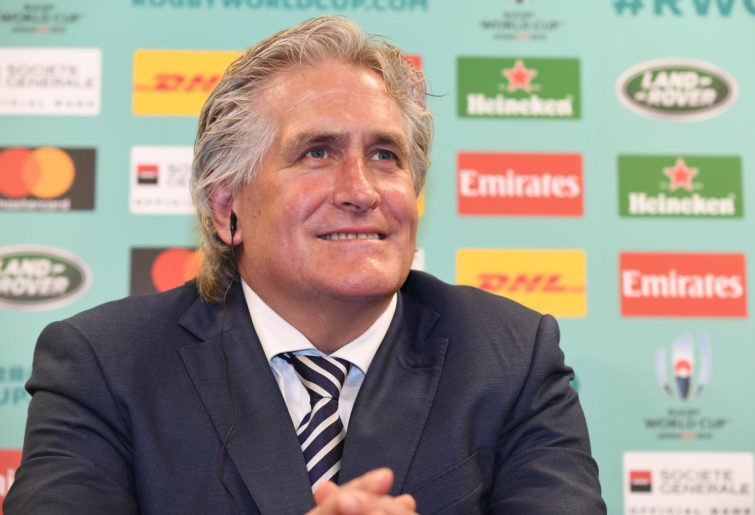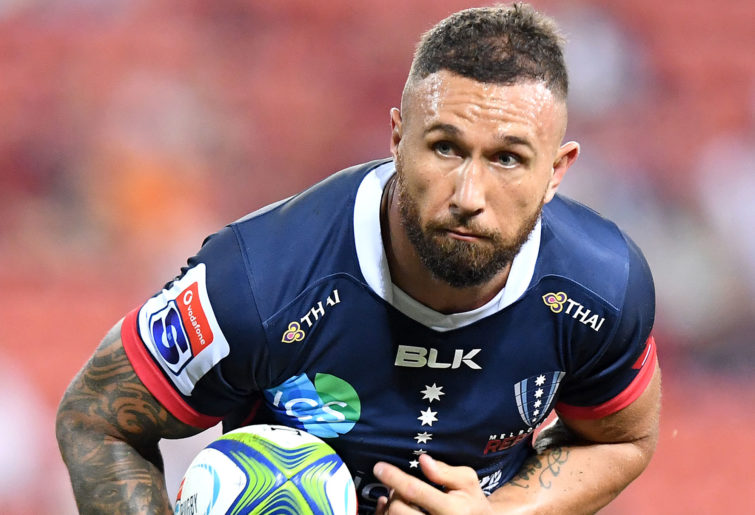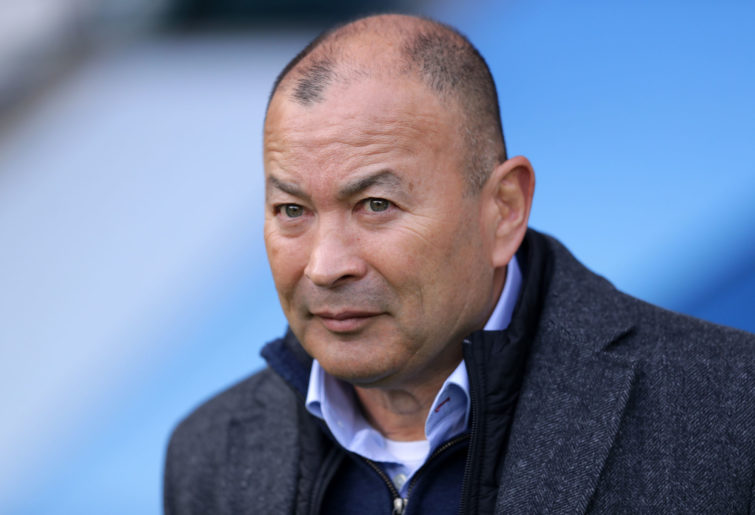John Singleton made a fortune for himself and his clients by simplifying the advertising he created around selling the product’s Unique Selling Proposition.
Singleton had the genius to understand that the point of advertising was to sell the product.
Unlike most of his competitors, Singleton was not interested in winning awards for the creativity of his advertisements.
All he was interested in was doing what was he was being paid, handsomely, to do: to sell the product!
Now what has this to do with the sorry plight of the Wallabies over the last few years?
Bear with me while I explain.
Scott Johnson, the newly appointed director of rugby, has now made his first comments on the state of the Wallabies and what needs to be done to rescue the product (if I can use this word about what should be an Australian sporting icon) from its present parlous state.
What did Johnson tell the gaggle of reporters at this first media conference, and through them the wider Australian rugby community?

(Photo by Atsushi Tomura/Getty Images)
Here are the opening paragraphs of Wayne Smith’s report on the media conference for The Australian (‘Wallaby boss says our DNA has faded’):
“The newly-appointed director of rugby in Australia, Scott Johnson, wants the Wallabies to recapture their reputation for producing skilful and smart rugby.
“Acumen and skill were once embedded in the DNA of the national side. However, physicality has been the focus of Wallabies head coach Michael Cheika in the lead-up to the World Cup, which is only 175 days away…
“Johnson didn’t even mention the word “physicality” yesterday at his first press conference since arriving in Australia. But “acumen and skills” he used three times.”
This gets us back to John Singleton’s USP.
The point of the Wallabies, their USP, is for them to win Tests.
And how is this to be done? According to Scott Johnson through creating a culture in the team that is focused on ‘acumen and skills’
‘Acumen and skills,’ Johnson’s DNA for a successful Wallabies sode, are the equivalent for the team of ‘price’ in the successful Singleton advertisements.
I believe that Johnston is right in his assessment. The current Wallabies squad and Australian rugby in general have lost their former genius for rugby skills and acumen.
Compare the current breed of players, all of whom have learnt their rugby in a totally professional era and environment, with the players up to 2003, virtually all of whom learnt their early rugby skills in the amateur era.
Has there been one player from the professional era, after 2003, who is better in his position that any player developed mainly in the amateur era?
George Smith is one player who comes to mind. Chris Latham, perhaps, as well.
Forget about historically great players like Smith and Latham. Are there any players who are standouts in terms of their skills and their rugby acumen playing right now?
Just looking at this weekend’s round of matches by the Australian sides, there are perhaps only two players, Quade Cooper and Will Genia, who fulfil Johnson’s dictate of ‘acumen and skill’ to some degree.
Like Mark Ella, who admitted in his Saturday column in The Australian that he has “never been a big fan of Cooper,” I have generally been critical (often very critical) of the Rebels playmaker.
But also, like Ella, I agree that we “certainly have to be prepared to consider” Cooper for the Wallabies.
The main reason for this is that there is no playmaker, outside of Cooper, currently playing for an Australian side who has more than average skills and acumen.
Cooper stood out because the others were so mediocre.
So in comparison to the others, there was a lot of smart play involved with Cooper’s decisive role in destroying the Reds at Suncorp.
I liked the way, for instance, he took the ball up hard on his first touch. This play told the Reds that he was prepared to meet their aggression with his own aggression.
He passed, as he virtually always does, with deftness and skill.
He made or at least tried to make tackles, even though tackling remains the (potential) weakest point in his game.
He kicked out on the full once. But made up for this with a deft kick-pass for Jack Maddocks to catch out wide to score a vital try.
The point about all this is even though he has been dropped from the Wallabies for several years and his career virtually a decade long, Cooper still has to be seen as a leading candidate to be the Wallabies playmaker.

(Photo by Bradley Kanaris/Getty Images)
When you think about this, it is an indictment on the lack of skills of all the other contenders.
Moreover, when you go through all the positions, backs and forwards, of the Australian Super Rugby player this question arises: Where are the players with the acumen and skills that Scott Johnson says should be the DNA of their game?
The cupboard is bare.
Even someone like Israel Folau, the prolific try-scorer, is singularly lacking in rugby acumen. His skills are essentially elemental, leaping prodigiously and occasionally running with power.
Compare Folau’s game with that demonstrated by his New Zealand equivalent, Reiko Ioane.
The All Black is an immeasurably more skilful and effective player than Folau, with his reading of the game and his positional play (acumen) and his passing and running skills are vastly superior to that of the Wallaby star, also.
This gets us back to Scott Johnson’s priority for the Wallabies of creating players with skills and acumen.
When Johnson was a club player out at Penrith and then a coach under the guidance of that great rugby man, Peter Fenton, skills and acumen were the essential elements in the Australian game.
An example of these qualities in Johnson, for instance, a stocky and clever playmaker in the Rod Kafer mould come to mind with a story he once told me about a play Fenton and he devised.
As the playmaker, Johnson started to stand wider and wider from the base of the scrum. After about three such scrums, Johnson was about 15m away from his halfback.
His opposite number kept on following across the field until there was this massive gap between the scrum and where he was defending.
Sure enough, Johnson’s blindside winger came cantering through the gap to score an easy try.
This move was an old ploy and a good one.
It was used by the 1937 Springboks (‘the greatest team to leave New Zealand’) in the decisive third Test at Eden Park to score a devastating try that demoralised the All Blacks, along with the Springboks taking scrums instead of lineouts on their own feed.
The point here is that Australian rugby, at all levels up to 2003 and the end of the Rod Macqueen coaching era, was skilful and smart.
What Scott Johnson is proposing is going back to the era when skills and acumen were traditional in the Australian rugby game, and at all levels of it.
This skills and acumen regime, as well, created unparalleled success for the Wallabies. This is the point about trying to revive the regime.
The Wallabies under Alan Jones won back the Bledisloe Cup in New Zealand and followed this up with a Grand Slam tour of the United Kingdom and Ireland.
The Wallabies under Bob Dwyer, a coach who claimed he knew over a thousand crucial things about rugby and had 36 moves off the back row, won the 1991 RWC tournament, defeating the All Blacks in the semi-final.
And under Rod Macqueen, from 1998 to 2003, the Wallabies won the 1999 RWC tournament while conceding only one try, regained and held on to the Bledisloe Cup, defeated the British and Irish Lions and won every other trophy available to be won.
During the Macqueen era, the Wallabies were seen in New Zealand as being so much smarter than the All Blacks (‘acumen’) that the difference was attributed to the fact that most of the Wallabies were educated at private schools rather than the public schools for the All Blacks.
All these triumphs, in fact, were based on coaches who were obsessed with skills and rugby acumen and a rugby culture in Australia that inculcated it starting at school, whether they were private or government-run.
The trend to physicality over skills and acumen began with Eddie Jones. Jones was obsessed with players following a designated, imposed game plan.

(Photo by Richard Heathcote/Getty Images)
Robbie Deans tried to reverse the process by introducing gifted players like Quade Cooper, James O’Connor and Kurtley Beale. He tried, too, to coach the players to ‘play what is in front of them.’
The Three Amigos performed more spectacularly off the field than on it, unfortunately.
And the other players, with less natural ability than the Three Amigos, virtually refused to develop the skills and acumen the Deans plan required of them.
Under Michael Cheika, the Wallabies have doubled down on the physicality game introduced by Jones.
There are, as Wayne Smith has pointed out, about 170 days to go before the RWC tournament in Japan starts. The Wallabies have a handful of Tests to try and come to grips with the Johnson Doctrine of ‘skills and acumen,’ provided that Cheika goes along with the concept.
The Wallabies are almost in the same situation of England before the final of the 1991 RWC tournament.
A decision was taken by England to give up its attrition game and try to match Dwyer’s Wallabies with skilful rugby.
As David Campese pointed out very perceptively at the time: “You can’t learn to play running rugby in five minutes.”
Will six months be enough for the Wallabies then to change their game plan and condition old and new players towards the smart game?
Will Cheika even go along with the concept?































































































